👇 Psst... scroll down to fill out the details and add to your cart! 👇

Each package comprises a personalized certificate with the recipient's name, an 8 x 10 photo, and qualifies for a tax receipt.
(Buchephala Clangula). Patient Number 25-643
Date of admission: June 11, 2025.
Reason for admission: Orphaned.
Patient History:
Common Goldeneyes are one of the few duck species that breed in tree cavities. They will search for the ideal hollow for nesting, some of which may be formed by broken limbs or holes from large woodpeckers. Their breeding areas mainly consist of the boreal forest regions found in Canada and Alaska, where they will reproduce from roughly late March to mid-July. The mother will incubate the eggs for 28-32 days, while the father typically leaves within the first two weeks of incubation.
Brood parasitism—where the mother will lay her eggs in another Goldeneye’s nest— is quite common among this duck species as opposed to other ones.
On top of this, conflict among Goldeneyes is fierce, as young have been known to be killed by other Goldeneye mothers as an act of competition, which is not common in other duck species. The interesting thing about Common Goldeneyes is that their primary diet when nesting is insects, but they prey on crustaceans in the winter and during migration.
While the name of the species is derived from their intensely coloured yellow-golden eyes, you can tell the sexes apart well. The males have a glossy green head, with a circular white patch below the eye, and a black body with a white tummy, while the females have a brown head and a mainly grey body.
Common Goldeneyes are considered to be “short-distance migrants,” meaning they will typically only fly shorter distances to more temperate climates.
Goldeneyes may choose to migrate to certain areas of North America, including southern Canada, the United States, and Northern Mexico.
This orphaned Common Goldeneye was brought to us from Okotoks, Alberta. Since then, our rehab and animal care team has been working tirelessly to care for and raise this duckling, along with (currently) 65 other ducklings. These waterfowl will then be released in the coming months as they grow to the age of self-sufficiency.
